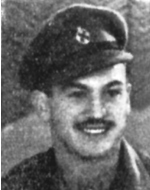Yitzhak, son of Gitel-Dvora and Israel-Yosef, was born on 25.1.1927 in Poland, in the city of Vallada. He studied at the “Tarbut” school in his city. Was educated in a Zionist atmosphere in the home of his parents, who longed to immigrate to the Land of Israel but were unable to do so. On the eve of World War II, about three and a quarter million Jews lived in large, well-established communities. Even before the war anti-Semitism flourished in the country, and the situation of the Jews worsened all the time. On September 1, 1939, the war broke out when Germany began the conquest of Poland. Immediately after the occupation, the Jews of the state were concentrated in ghettos and later sent to concentration and extermination camps. By the end of the war about three million Polish Jews had been murdered. All members of Yitzhak’s family were sent by the Nazis to the extermination camp and murdered. Only he managed to escape, and in 1943 joined the partisans in the forests. Since then, he has been doing his best for partisan activities against the Nazi enemy. When the Russians repulsed the Germans in 1944, Yitzhak was sent along with several other young men to the city of Mohilev in White Russia, where he underwent training to serve in the state police. While he was there, he recalled the aspirations of his parents and the words of his grandfather, R. Feivel Lederman, that the Jews should not devote themselves to the service of foreign tendencies but rather to the liberation of their historic homeland. Yitzhak decided to run away, and asked his commanders for a vacation to go to his hometown and see if someone from his family had survived, even though he knew that no one had survived. Upon his arrival in Poland he set out on the “escape route” to Italy. The “Bericha” was the movement of mass emigration after World War II, and the name of the organization that guided the flow of those leaving. Some 250,000 Holocaust survivors, mostly from Eastern Europe, left the camp and moved to the DP camps in the West (Germany, Austria and Italy), from which they sought to reach ports of departure from which they could sail to Palestine. The Bericha movement began spontaneously, but took on an organized and planned form when the Haganah’s Mossad Le’Aliyah Bet dealt with obtaining ships, their equipment, and bringing the immigrants to Palestine. Yitzhak arrived in Italy and left Bari. He arrived in Israel in 1946, and shortly thereafter settled in Haifa and began working in a textile factory. After his arrival, Yitzhak stayed for a while in “Metzudat Ze’ev” in Tel Aviv and joined the Irgun underground. His underground nickname was “Commander Zedekiah.” As part of the underground, he participated in many operations against the British and later against the Arabs in the north, despised death and danger and was known for his courage. In April 1948, the Irgun learned that a British train loaded with ammunition was to leave Haifa and that the organization was preparing to thwart the possibility that the weapons would be handed over to the Arabs On 17.4.1948 a force of dozens of fighters from the Irgun base in Shuni, And about forty trucks.The force blew up the tracks and put an ambush on the train near Pardes Hannah, and the train that had stopped stopped and Irgun fighters stormed it. A British security force, sitting in two armored cars, opened heavy fire on the fighters, killing three Etzel members, among them Yitzhak, and the Irgun fighters continued to fire on the train, calling on the British soldiers to surrender. When the British surrendered and the fire stopped, the Irgun fighters stormed the train and took out dozens of tons of expensive ammunition, including artillery shells and heavy mortar bombs, some of which later served the Irgun fighters in the Battle of Jaffa. Yitzhak was twenty-one years old when he fell, and was brought to eternal rest in the military cemetery in Nachalat Yitzhak, where he was the last survivor of the Holocaust, the survivors of the Holocaust who remained the last remnant of their nuclear family, parents, brothers and sisters. On their own, the threat of the Holocaust in the ghettos and / or the mountain campsExtermination and / or fleeing and hiding in territories occupied by the Nazis and / or fighting alongside members of the underground movements or partisans in the Nazi-occupied territories who immigrated to Israel during or after World War II, wore uniforms and fell in the Israeli army.
